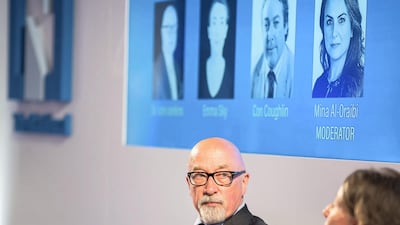The UK's former envoy to Syria, who led a review into the Muslim Brotherhood, said courts had an important role in tackling extremism.
Sir John Jenkins, previously the UK ambassador to Syria, Iraq, Libya and Saudi Arabia, reflected on the different responses in Europe to a spate of recent terrorist attacks.
Atrocities led to France and Austria introducing tougher measures to tackle extremism.
Last month, France banned the Collective Against Islamophobia in France (CCIF) charity, which is linked to the Muslim Brotherhood and its founder's grandsons, Tariq and Hani Ramadan, without allowing it recourse to appeal.
The government called the charity an “Islamist pharmacy” and the ban led to accusations of Islamophobia and to French President Emmanuel Macron being described as anti-Muslim.
In an online seminar for think tank the Counter Extremism Project, Sir John said the law should be used when considering bans and cited the case of the CCIF.
“Looking at the talk on Twitter from the US talking about the banning of the CCIF and saying it is anti-Muslim and Islamophobic. It may or may not be, but the way you test this is in a court of law,” he said. “This has just happened in Austria, where the previous ban on the veil in kindergartens has just been challenged in front of the constitutional court and the constitutional court struck it down.
“The way you litigate and adjudicate these disputes, which are essentially about social issues and social order, is in a court of law, and that court of law is secular.”
France launched a crackdown on extremist groups after the murder of teacher Samuel Paty after he showed students cartoons of the Prophet Mohammed during a lesson on free speech, and a subsequent attack in Nice’s largest church that killed three people.
The country also banned pro-Hamas group the Cheikh Yassine Collective, named after the founder of Hamas, after it was accused of being implicated in the schoolteacher's beheading, and a Paris mosque that shared a denunciation of Paty online was also closed.
Prime Minister Jean Castex said authorities were targeting “all associations whose complicity with radical Islamism has been established”.
Under French law, the Council of Ministers can dissolve an organisation by decree without requiring scrutiny of the decision.
This month, the French government unveiled draft legislation aimed at better arming France against radicalism, a project promoted by Mr Macron to root out what he calls separatists undermining the nation.
The bill targets home schools, mosques or associations that circulate an ideology running counter to French values, which authorities are calling the “Islamist hydra” that can cultivate violence in some extremists.
Critics said the draft law is too soft or a political manoeuvre by Mr Macron ahead of 2022 presidential elections to entice followers from the far right.
“The heart of this is the question of law for me,” Sir John said. “If you look at the new draft law the Macron government is bringing forward, one of the key elements of this is the demand, essentially, that everybody recognises the absolute primacy of French law.”
He highlighted Austria as one of the countries tackling the issues of extremism. “In terms of the way the politics has played out, it is very interesting to see how in the last 10 years the public discourse about Islamism, as a matter of public concern about social order, has become more acute,” he said.
“It has been taken up by governments in a way it wasn’t 10 years ago, particularly in Austria.”
Austria has created an observatory to examine political Islam and is banning extremist groups on the back of the Vienna attack.
The mass shootings by a convicted ISIS extremist uncovered a large terrorist cell and a litany of major failings by the national security services.
Austrian Chancellor Sebastian Kurz proposed a ban on membership of designated extremist organisations, granting authority for police to close mosques and other institutions deemed radical and increasing powers to strip radicalised individuals of their citizenship.



